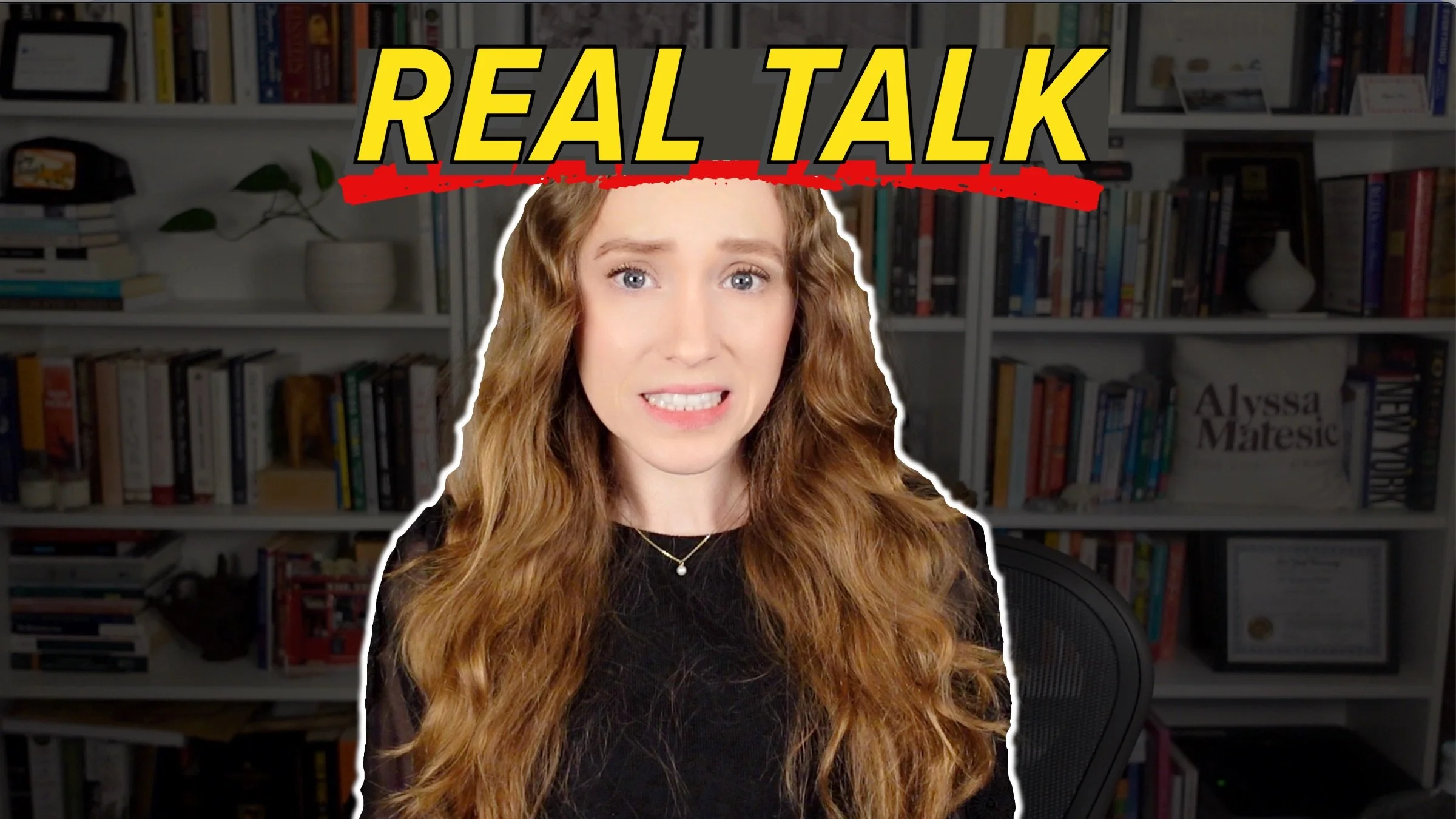Why Literary Agents Didn’t Like Your Novel Opening Pages
HIT PLAY OR READ THE POST BELOW:
If you've been querying and are only getting literary agent rejections or no response at all, then you're probably wondering, “What is wrong with my query?” There are two parts to your query package—the query letter and the sample pages—so chances are, if you feel confident in your query letter, that agents are not responding positively to your novel opening pages.
Your novel opening pages are arguably the most important part of your query package. The first 10 pages typically determine whether an agent is going to request the full manuscript or pass on your query altogether. Since the opening pages of your novel are so important, in this article I’m going to go over specific reasons why agents might not have liked your sample pages and give you tips on how to strengthen them so agents might feel inspired to request your full manuscript. I know it can be tough to decipher literary agents' responses, because oftentimes they have to use form rejections to get through their queries, so you can’t really get a sense why they are rejecting it.
My intention here is to give you some more insight into what they are looking for in a novel’s opening pages, so you can cross check your work and make sure those pages contain all of these important traits.
The Pace Is Too Slow
The first reason why agents might not be responding positively to your novel’s opening pages is if it takes too long to reach the inciting incident of the plot. In the opening pages, it is critical to nail the right balance of exposition and action, because you want to immerse the agent in the novel's world while also kickstarting the action and establishing momentum.
In my view, the story's inciting incident is the first domino that knocks over all the rest; it is the initial plot development that causes the chain of events we follow throughout the rest of the novel. Ideally you want to reach this inciting incident early on in the story, especially within the first 10 pages, because this will help establish intrigue and a sense of urgency.
Now, it's not always going to be possible to have the inciting incident come in those first 10 pages, as it all depends on how your novel is structured. But if you can't put the incident itself in the first 10 pages, try to at least give a sense of what the novel is building up to. For example, say that the inciting incident of the plot is the protagonist getting named Homecoming Queen. Having the protagonist win her crown could happen in the first 10 pages, but if that doesn't work for whatever reason, establishing that homecoming is quickly approaching in those initial 10 pages will still clue the reader/agent in on what’s to come.
The Characters Are Unrelatable
You might be receiving literary agent rejections because they didn't connect with the characters. Most readers’ enjoyment of a book largely comes down to whether or not they connected and empathized with the characters. After all, we are all human, so part of the joy of reading fiction is immersing ourselves in another person's experiences. So, if your character comes off as annoying, melodramatic, unrealistic, or even overly bland in those opening pages, then it's possible that the agent is not going to be inspired to read more of the story.
Now keep in mind that when I say connecting or empathizing with the characters, I am not saying we need to like the characters or agree with their values and actions. Readers can and should still connect with villains, for example; we just need to be intrigued enough by them to be interested to see what happens to them over the course of the story.
The Stakes Are Unclear
The next reason why agents might not have liked your novel opening pages is if the stakes are unclear. If there's nothing at stake in the story, meaning that the events of the plot have no real ramifications on the characters, then it's unlikely that an agent is going to get invested in the novel.
I recommend doing a thought exercise where you pinpoint exactly what the main characters have to gain or lose from the events of the plot. Think about your story and try to fill in these blanks: My main character must do _____ because if not, then ______. When you write this sentence out, you are going to illuminate the stakes, which will make an agent emotionally invested in the story.
Every successful bestselling book has something strong at stake. For example, in the Harry Potter series, Harry must stop Voldemort because if not, then Voldemort will take over the world. In The Great Gatsby, Jay must compel Daisy to leave Tom because if not, he will never achieve his vision of a perfect life.
As the author, it’s likely that the stakes of the story are crystal clear to you. However, make sure the reader can pick up on them, especially in the opening pages of your novel. Establishing the stakes of the story as soon as possible is critical to getting a reader (and agent) invested.
The Writing Isn’t Polished
A literary agent might not like your novel opening pages if the writing style doesn’t pull them in. Literary agents are looking for a certain level of writing quality in your sample pages before they even consider requesting the full manuscript and offering you representation. So, even if your pitch sounds great, if the writing isn't up to their standard, they are going to pass.
Unfortunately, they are unlikely to tell you directly that your writing wasn't at their standard and that's why they passed on your novel. In this case, they’re probably going to use more formulaic and vague language to reject your query, so that's why it can be helpful to work with critique partners, beta readers, or even a professional editor to ensure that your writing is polished before querying.
Sometimes, even if your writing is clear and consistent, it’s still possible that your particular style and voice just didn’t resonate with the agent. Some writers enjoy crafting long, vivid descriptions; others have a simplistic, straightforward approach to their prose. Similarly, some writers prefer to write in third person and others prefer to write in first person. All these styles are perfectly valid, but they also all factor into an agent’s experience of your story. Remember: writing is an art, and thus it’s subjective. Because of that, publishing professionals’ tastes are also subjective.
There is no right or wrong way to write. I advise leaning into your own personal creative writing style rather than trying to adhere to what you think a literary agent wants. Everyone's writing is unique, and that's what makes it special. The right agent for you is going to be one that responds positively to your particular style.
The Story Just Wasn’t For Them
As I just said, book publishing is a totally subjective business. An agent has to be super passionate and in love with your book if they’re going to extend an offer of representation to you. That's because with every book that they take on, they're taking ownership of pitching it to editors and publishers, trying their best to sell your story to them.
Agents can only offer that level of support to a select number of clients, which is why they are very highly selective about who they sign. So even if they recognize your writing talent or the potential for your book, they're not going to take you on as a client unless they feel that strong level of passion for your book.
The beauty of this fact is that when you do sign an agent, you should feel confident that they are there to support you and they want to see your book published just as much as you do. Literary agents are seeing if your book and your project has commercial appeal and matches their personal tastes. So, at the end of the day, sometimes your story just isn't the right match for that agent. This is a factor that is out of your control, but it shouldn’t keep you from continuing to query.
I hope these tips help you better understand how a literary agent goes about evaluating manuscripts and helps you strengthen your first 10 pages.
Thank you so much for reading, and happy querying!





